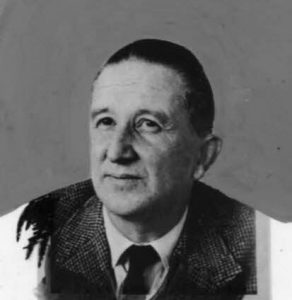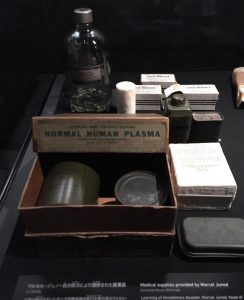Documenting Hiroshima of 1945: September 8, Marcel Junod arrives in Hiroshima
Sep. 8, 2024
by Maho Yamamoto, Staff Writer
On September 8, 1945, Marcel Junod, head of the International Committee of the Red Cross (ICRC, based in Geneva, Switzerland) Delegation in Japan and a physician who died at the age of 57 in 1961, arrived in Hiroshima from Tokyo. Mr. Junod came to the city to deliver around 15 tons of such supplies as medicine, disinfectant, and bandages.
According to his personal account, Mr. Junod had learned of the situation in Hiroshima through a telegram he received from Fritz Bilfinger, a staff member at the ICRC Delegation in Japan who had entered Hiroshima earlier, on September 2. Mr. Junod negotiated with people reporting to General Douglas MacArthur, the Supreme Commander of the Allied Powers, and obtained the supplies. He boarded a U.S. military plane that was to fly to Hiroshima for the conduct of a survey, and stayed in the city until September 13.
In his personal account titled Hiroshima no Sangyaku (in English, ‘The Hiroshima Disaster’), Mr. Junod described his experience of visiting a relief station set up in a half-destroyed school building. “The heavy rain beat directly down on the patients’ room,” he wrote. Large pieces of cloth were used as bandaging. The medical care provided to the patients was rudimentary, leaving wounds covered in flies. Because the Hiroshima Red Cross Hospital had run short of materials for blood testing, it was not possible to sufficiently perform blood transfusions, an important element in the treatment of patients with blood disorders.
With the broad distribution of Mr. Junod’s aid supplies, it is believed that several tens of thousands of survivors’ lives were saved. One was Chieko Kiriake, 15 at the time, who is a resident of Hiroshima’s Asaminami Ward and now 94. After her mother heard that someone from overseas had brought medicine, she went to a nearby relief station and brought back pills for her daughter.
Ms. Kiriake, at the time a fourth-year student at Hiroshima Prefectural Second Girls’ High School (present-day Minami High School), experienced the atomic bombing at a location around 1.9 kilometers southeast of the hypocenter. Along with hair loss, she experienced blood oozing from her gums. Because a number of survivors died after developing similar symptoms, she was told by a physician that, “If you have blood in your stool, it’s all over.” Ms. Kiriake expressed her gratitude for being able to survive. “Thanks to the medicine and my mother’s care, I was able to gradually get better.”
While some of the survivors recovered, the atomic bombing took countless lives and caused persistent physical and psychological suffering. Mr. Junod implored in his personal notes to “abandon the use of nuclear power as a weapon.”
(Originally published on September 8, 2024)
On September 8, 1945, Marcel Junod, head of the International Committee of the Red Cross (ICRC, based in Geneva, Switzerland) Delegation in Japan and a physician who died at the age of 57 in 1961, arrived in Hiroshima from Tokyo. Mr. Junod came to the city to deliver around 15 tons of such supplies as medicine, disinfectant, and bandages.
According to his personal account, Mr. Junod had learned of the situation in Hiroshima through a telegram he received from Fritz Bilfinger, a staff member at the ICRC Delegation in Japan who had entered Hiroshima earlier, on September 2. Mr. Junod negotiated with people reporting to General Douglas MacArthur, the Supreme Commander of the Allied Powers, and obtained the supplies. He boarded a U.S. military plane that was to fly to Hiroshima for the conduct of a survey, and stayed in the city until September 13.
In his personal account titled Hiroshima no Sangyaku (in English, ‘The Hiroshima Disaster’), Mr. Junod described his experience of visiting a relief station set up in a half-destroyed school building. “The heavy rain beat directly down on the patients’ room,” he wrote. Large pieces of cloth were used as bandaging. The medical care provided to the patients was rudimentary, leaving wounds covered in flies. Because the Hiroshima Red Cross Hospital had run short of materials for blood testing, it was not possible to sufficiently perform blood transfusions, an important element in the treatment of patients with blood disorders.
With the broad distribution of Mr. Junod’s aid supplies, it is believed that several tens of thousands of survivors’ lives were saved. One was Chieko Kiriake, 15 at the time, who is a resident of Hiroshima’s Asaminami Ward and now 94. After her mother heard that someone from overseas had brought medicine, she went to a nearby relief station and brought back pills for her daughter.
Ms. Kiriake, at the time a fourth-year student at Hiroshima Prefectural Second Girls’ High School (present-day Minami High School), experienced the atomic bombing at a location around 1.9 kilometers southeast of the hypocenter. Along with hair loss, she experienced blood oozing from her gums. Because a number of survivors died after developing similar symptoms, she was told by a physician that, “If you have blood in your stool, it’s all over.” Ms. Kiriake expressed her gratitude for being able to survive. “Thanks to the medicine and my mother’s care, I was able to gradually get better.”
While some of the survivors recovered, the atomic bombing took countless lives and caused persistent physical and psychological suffering. Mr. Junod implored in his personal notes to “abandon the use of nuclear power as a weapon.”
(Originally published on September 8, 2024)









